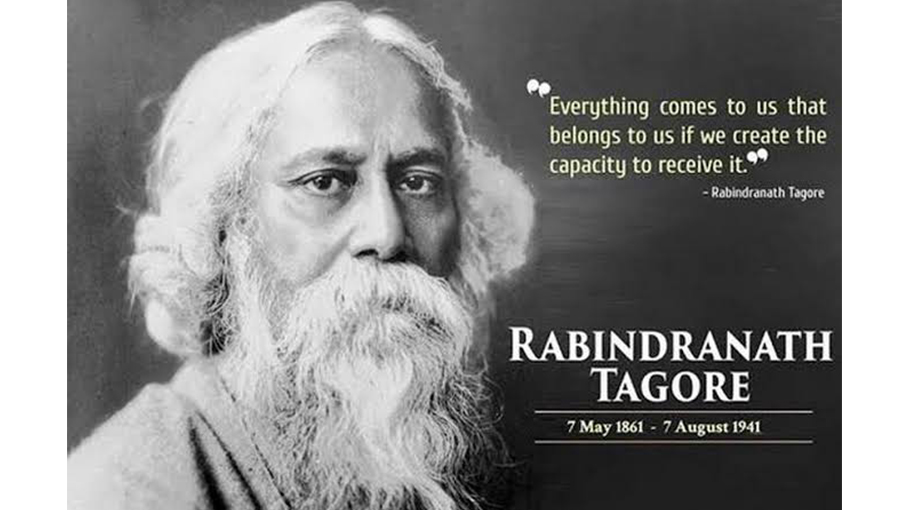A tribute to Tagore
The poet covers an intrinsic part of our everyday life and cultural identity

After two years of muted celebrations due to restrictions over the Covid-19 pandemic the nation on Saturday celebrated the 161st birth anniversary of the poet, philosopher and social thinker Rabindranath Tagore. Whether it is Bengali songs, poetry, novel, short stories or drama the name Rabindranath Tagore inevitably appears. His works have the power to guide us towards a profound social consciousness.
Tagore covers an intrinsic part of our everyday life and cultural identity. Tagore is a phenomenon which blends the core relation between art, music, poetry, drama and literature though such grand description does not do adequate justice to his potential. He is the person who single-handedly reshaped Bengali literature and music with contextual modernism. Bangla literature would have remained latent to the rest of the world without the magic conjured by Biswakabi Rabindranath Tagore.
Born on May 7, 1861, at Jorasanko Mansion in Kolkata, he was the youngest of 13 surviving children of Debendranath Tagore and Sarada Devi. He became Asia's first Nobel laureate after winning the Nobel Prize in literature for “Gitanjali” in 1913.
Rabindranath's creations cannot be boxed into any one category. A reader may spend a lifetime with Rabindranath's poetry, fiction, drama, and essays. He is one of those great masters of literature whose works hardly left any human emotion untouched. The poet was much ahead of his time and his music still plunges our mind into his idiosyncratic melody. A musician who falls under the spell of his songs would make her home in Rabindra Sangeet for life, as many have indeed done. Practitioners of theatre and dance have likewise devoted a good part of their creative life interpreting Tagore's plays and dance-dramas.
Tagore’s writings reinforced and re-constructed Bengali literature in a way that only a handful of ground-breaking Bengali writers had done before him, going back all the way, a thousand years earlier, to the authors of Charyapad, the Buddhist literary classics that first established the distinct characteristics of early modern Bengali. Tagore was the pioneer of modern Bengali literature who introduced the use of colloquial language into Bengali literature. He also introduced new prose and verse forms.
In the introduction to 'Gitanjali', for which Rabindranath Tagore won the Nobel Prize in 1913, WB Yeats wrote, "We write long books where no page perhaps has any quality to make writing a pleasure, being confident in some general design, just as we fight and make money and fill our heads with politics - all dull things in the doing - while Mr Tagore, like the Indian civilization itself, has been content to discover the soul and surrender himself to its spontaneity." In Bangladesh and Kolkata we hardly could think of any cultural-evening without Rabindranath. But it is also true that youth of this generation do not read Tagore as widely as our previous generations did. However, Tagore still retain his devotees and his works hitherto matters to the world.
Tagore's works include hundreds of novels, short stories, dance-dramas, poems, essays and travelogues. Tagore is the person who gave us our National Anthem. He composed the National Anthems of two nations - Jana Gana Mana Adhinayaka Jay for India and Amar Shonar Bangla for Bangladesh. Although he wrote successfully in all literary genres, he was first of all a poet. Moreover, his literary status is profoundly influenced by the esteem of his poetry. His poems considered to be the most warm and lingering in Bengali literature. Tagore’s perpetually creative poetry plunges the readers into the interplay between the eternal and ephemeral.
Among his fifty and odd volumes of poetry, Gitanjali, Manasi, Sonar Tari and Balaka are most feted. Tagore’s major plays are Raja, Dakghar, Achalayatan ,Muktadhara, and Raktakaravi. He is the author of several volumes of short stories and a number of novels. Also he wrote musical dramas, dance dramas, essays of all types, travel diaries, and two autobiographies.
Apart from his iconic body of work in field of literature, Tagore was also an expert in music who penned more than 2,000 beguiling songs known as Rabindrasangeet. He is the founder of a school and a university, both of which are still going, in Santiniketan, West Bengal.
However, Tagore also faced harsh criticism from few Marxist writers in Bengal. More than 60 years ago, a few Marxist writers in Bengal had attacked Tagore’s literary philosophies and skills. There is no denying that some of them tagged Tagore as a ‘bourgeois sahityik’, but it was not the voice of all Marxist poets and authors. There were many who had also opposed such harsh comments. In the early 1960s, the same writers who had made such derisive remarks retracted their statements. During Tagore’s centenary year, many Marxist writers like Gopal Halder, Bishnu Dey, Hiren Mukerji and others came out and wrote honourable pieces on Tagore. In the seventies, during the Naxalite period, Tagore was criticised again by the Marxists. So it has been a recurring thought but to say that all Marxists and their policies were anti-Tagore was wrong propaganda.
Even after many years of Tagore’s death, we can feel his presence around in the air when we listen to his songs and read his poems. Criticisms have never been able to tarnish his reputation rather it revived his philosophies as a mystic poet. Tagore's works still have the magic to enlighten us and therefore, we urge our youth to rediscover the magic of Tagore which can guide them to build a profound social consciousness in their philosophy and lifestyle. Invoking Tagore's philosophy and message of love and brotherhood, we urge all our fellow human beings to strive to translate his timeless thoughts and messages into reality. Today, as we are traversing through the inexorable process of globalisation, the thoughts of Tagore – the great humanist – will be all the more valuable for us, as for the whole of mankind,
Sayeed Hossain Shuvro is Editorial Assistant, Bangladesh Post



